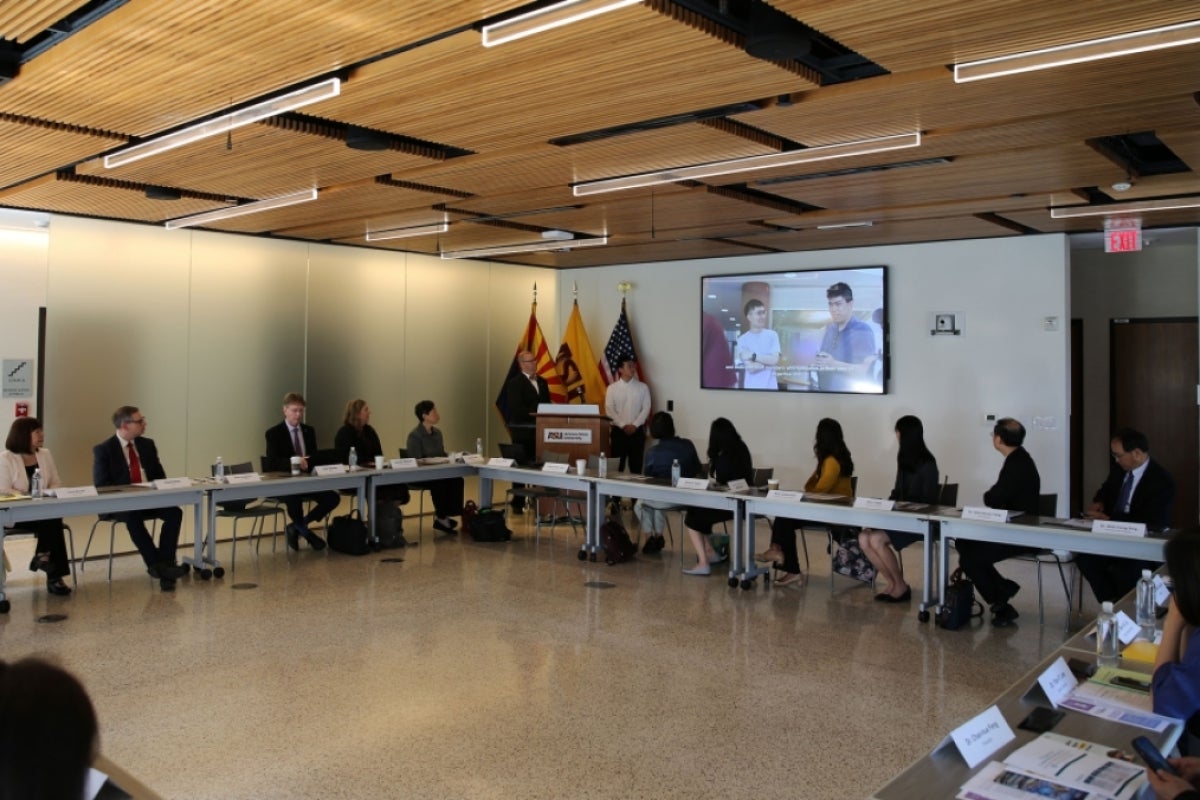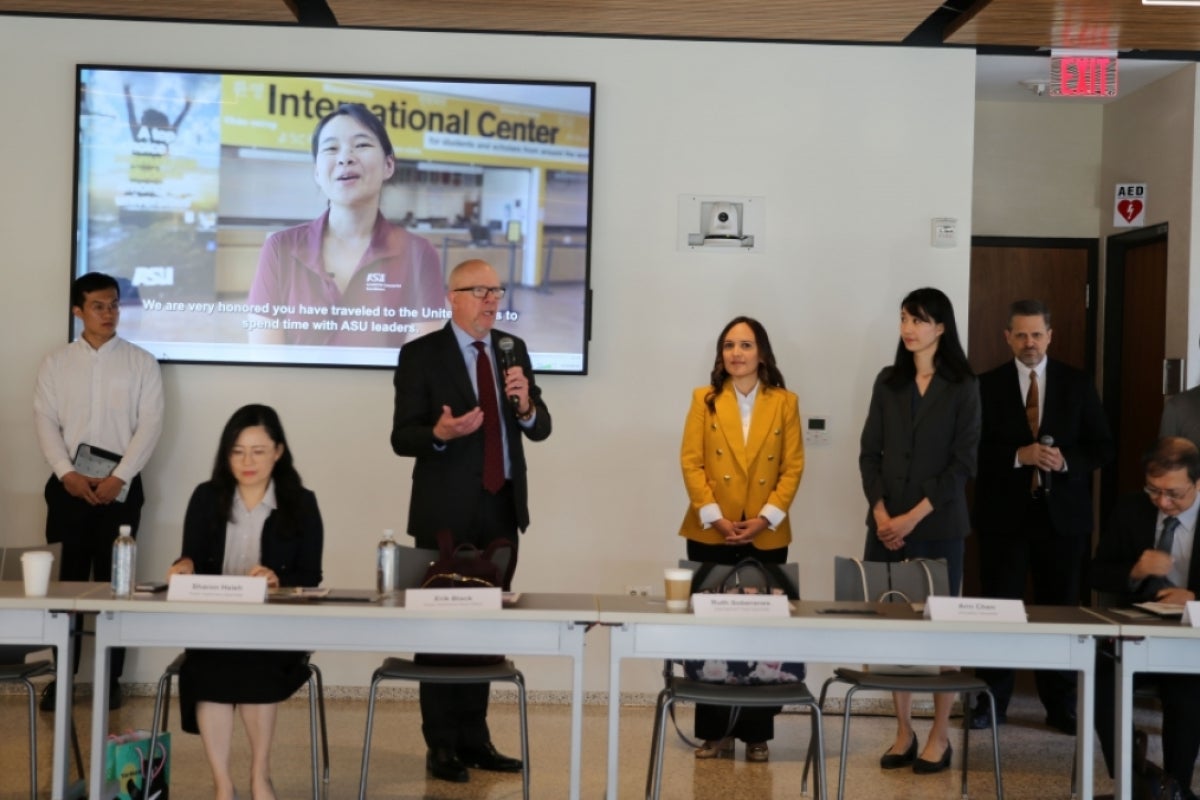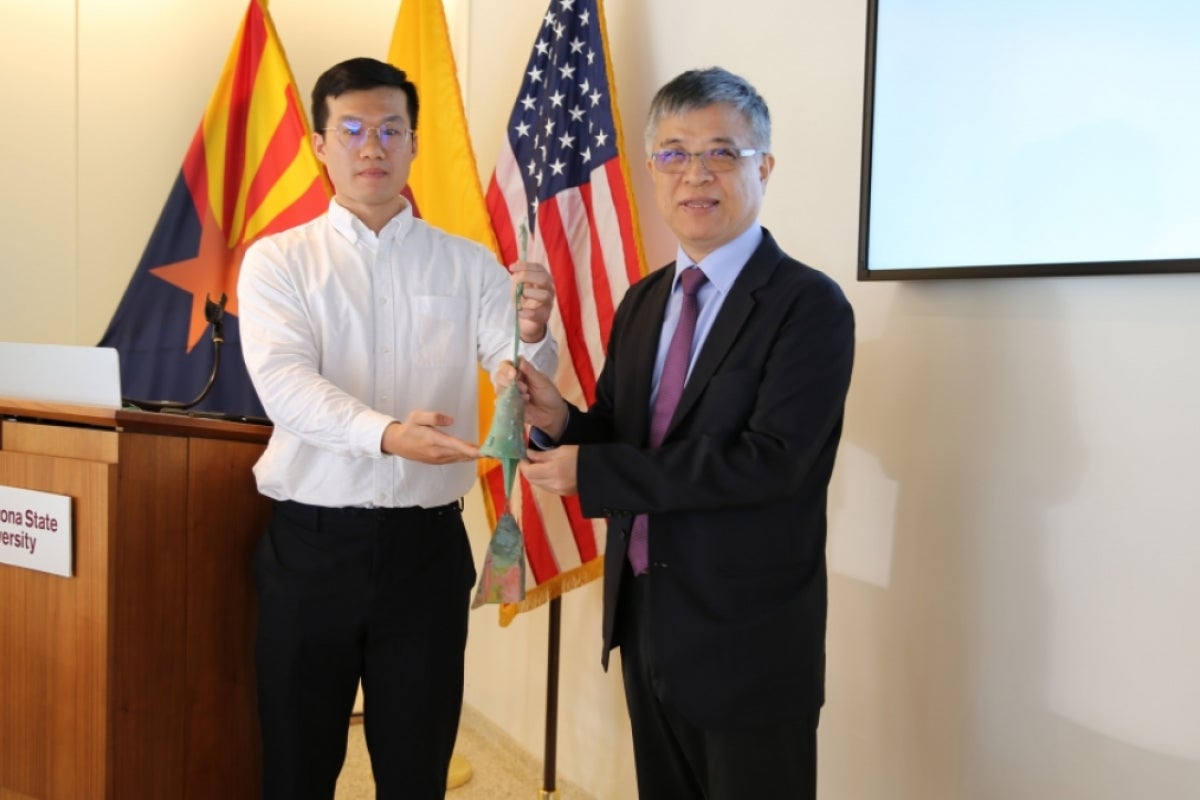ASU leaders meet to advance partnerships with top Taiwanese universities

Brokered by the U.S. Commerce and State departments, executive staff from nine Taiwanese universities along with the Taiwanese Ministry of Education convene at the ASU Barrett & O'Connor Washington Center on May 31 to discuss educational partnerships related to semiconductors, Mandarin education and international finance with a delegation from ASU. Photo by Catherine Llamido
Earlier this year, as Taiwan Semiconductor Manufacturing Company (TSMC) broke ground on its $40 billion investment of two chip manufacturing centers in north Phoenix, ASU announced its role in scaling the industry in Arizona. Since then, the Taiwanese government and leading Taiwanese universities have sought out ASU as a partner in developing the skilled workforce needed for thriving global exchange between the two nations’ economies.
That focus — advancements in postsecondary engineering and business education to prepare more students for career paths in the field — was on the agenda May 31 at the ASU Barrett and O’Connor Washington Center in Washington, D.C., as ASU leaders met with Deputy Minister of Education Mon-Chi Lio of Taiwan, representatives from the U.S. departments of State and Commerce and a delegation of nine prestigious Taiwanese universities to address semiconductor education, support for adjacent industries and workforce development.
ASU leaders at the meeting included Deans Kyle Squires and Ohad Kadan, Deputy Dean Lena Booth and Vice President Kent Hopkins. The delegation from Taiwan included the following leaders from leading Taiwanese universities:
- John Wei-Yuan Kao, president of National Tsing Hua University.
- Jing-Yang Jou, president of National Central University.
- Zhang-Hua Fong, president of National Chung Cheng University.
- Han-Chieh Chao, president of National Dong Hwa University.
- Shih-Torng Ding, executive vice president of National Taiwan University.
- Shih-Hsuan Yang, vice president of National Taipei University of Technology.
- Shun-Hua Wei, vice president of National Yang Ming Chiao Tung University.
- Lucia Hsiao-Chuan Chen, vice president of Tamkang University.
- J.C. Liu, vice president of National Taiwan University of Science and Technology.
The group exchanged ideas on what skills its students need to develop to ensure fruitful and lasting partnerships between the U.S. and Taiwan. Among the topics discussed, the Taiwanese Ministry of Education presented the following seven proposals for cooperation with the U.S., with an emphasis on advancing academic alliances between ASU and the institutions present:
- Placement of qualified Taiwanese STEM teachers in U.S. primary and secondary schools.
- Placement of qualified Mandarin teachers and teaching assistants in U.S. primary and secondary schools.
- Formation of foreign student short-term Mandarin study groups.
- Promotion and expansion of the Taiwan Huayu BEST Program.
- Creation of academic alliances between universities.
- Exchange (“twinning”) between Taiwan and the U.S. primary and secondary schools.
- Recruitment of English teachers and assistants to teach in Taiwan.
ASU’s academic leaders, including Kyle Squires, dean of the Ira A. Fulton Schools of Engineering, were eager to share about ASU’s role in evolving Arizona as an emerging region for innovation in the U.S. and learn from the experiences of fellow academic leaders about how their universities are driving innovation in Taiwan.
“ASU has played a pivotal role in establishing Arizona as a thriving hub for research, innovation, education and training, not only in the realm of semiconductor chips but also across various other critical domains, all of which benefit from strong global partnerships,” said Squires. “It was an honor to meet with the Taiwan delegation. It’s clear there (are) tremendous opportunities for collaboration, leveraging our collective expertise to drive advancements through strategic partnerships that foster innovation, promote knowledge exchange, and contribute to the growth and development of technologies vital to our regions.”
The meeting was held alongside ASU’s participation in the 75th convening of the NAFSA Association of International Educators — an annual gathering of worldwide higher education leaders committed to advancing international education and preparing students for thriving careers in a globally connected world.
“The meeting was well aligned to the goals of NAFSA and demonstrated ASU’s design aspiration to engage globally in practice,” said Kent Hopkins, vice president for Academic Enterprise enrollment. “Our ASU delegation had a meaningful exchange of ideas with leaders from some of Taiwan’s most distinguished universities. It was equally gratifying to speak with them about the successes of the many Taiwanese students who are enrolled at ASU. Our Taiwanese students enrich our university with their perspectives, culture and experiences. We’re proud of them and the global community they help us create at ASU.”
In recent years, as ASU has ascended to be the No. 1 public university in the U.S. for hosting international students, enrollment has grown to 290 students from Taiwan joining ASU in a campus-based program in Arizona in fall 2022 — a population that has doubled in the past decade.
One such Taiwanese student who was present for the meeting with the ASU and Taiwanese delegation was Cheng-Chieh Liao, a master’s student in computer engineering.
“It was truly a privilege for me to have participated in this meeting,” said Liao. “Witnessing the collaboration between ASU and universities in my home country is thrilling. I am particularly excited about the prospects of future cooperation in areas such as Chinese language and culture, and the semiconductor field.”
University enrollment leaders anticipate that the presence of TSMC in Arizona and the impact of ongoing partnerships with Taiwanese universities will be a draw for ASU enrollment, as students in Arizona and around the globe seek career opportunities in semiconductor and related industries. These industries are expected to grow rapidly thanks in part to the passage of the CHIPS and Science Act in 2022, which released $52 billion in funding over five years to accelerate national security technology.
The work of this group will continue beyond this convening, and plans to build mutually beneficial academic alliances between institutions are underway. Alongside ongoing plans for partnerships between academia and industry in the semiconductor industry, ASU and its sister Taiwanese universities agreed to work collaboratively to expand foreign language education and continue dialogue on STEM education, as both topics reflect the goal shared by all universities — fostering global cooperation, understanding and engagement between its citizens.
More Science and technology

Breakthrough copper alloy achieves unprecedented high-temperature performance
A team of researchers from Arizona State University, the U.S. Army Research Laboratory, Lehigh University and Louisiana State…

4 ASU researchers named senior members of the National Academy of Inventors
The National Academy of Inventors recently named four Arizona State University researchers as senior members to the prestigious…

Transforming Arizona’s highways for a smoother drive
Imagine you’re driving down a smooth stretch of road. Your tires have firm traction. There are no potholes you need to swerve to…




